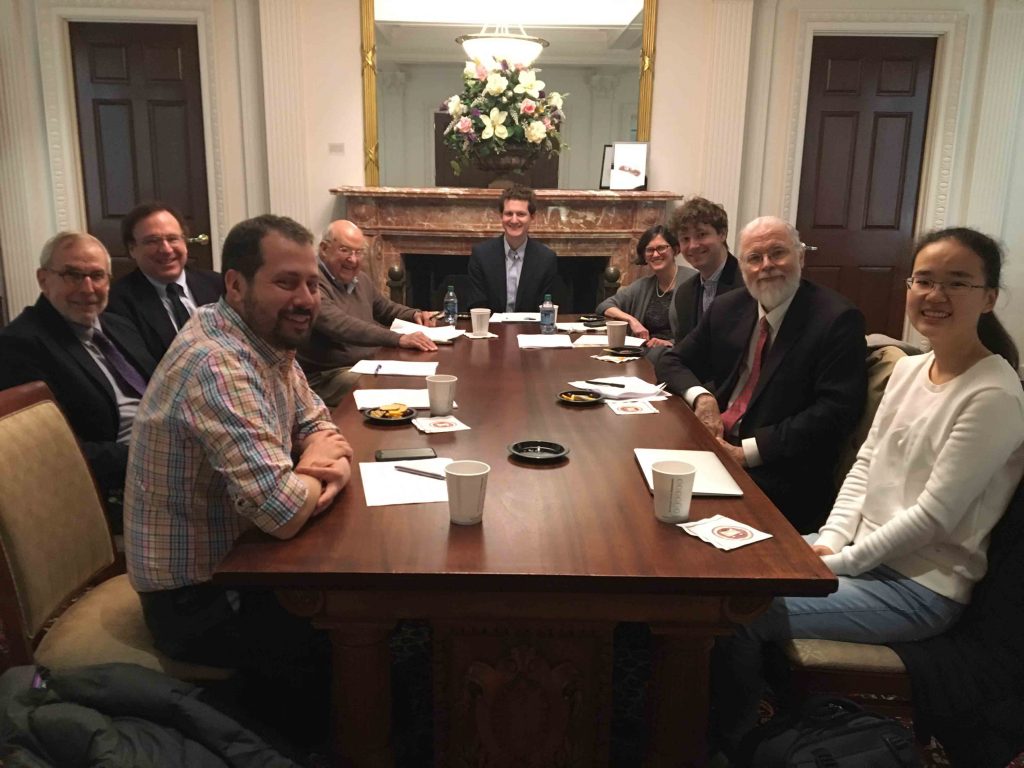Between four and six times annually, a scholar will travel to Boston College Law School to present a draft paper to the Legal History Roundtable. He or she will sit at a seminar table in the Daniel R. Coquillette Rare Book Room and hash over the draft with learned colleagues from BC and other area law schools. According to the rare book room’s namesake, J. Donald Monan, SJ, University Professor Coquillette, the visitors come, at least in part, because of BC Law School’s strong reputation in legal history.
That reputation rests on those of the roundtable’s co-conveners: Coquillette himself, Founders Professor of Law Mary Bilder, and Professors Frank Hermann, SJ, and Daniel Farbman.
Having published on both English and American legal history, Coquillette is now writing a second volume of his history of Harvard Law School, with co-author Bruce Kimball of Ohio State. (The first volume, On the Battlefield of Merit, won the Peter Dobkin Prize for research into nonprofit institutions.) Bilder’s Madison’s Hand, a thorough dissection of James Madison’s notes on the Constitutional Convention, won the prestigious Bancroft Prize and garnered favorable notice in the Washington Post and Wall Street Journal. Her next book will treat the feminist lecturer Eliza Harriot Barons O’Connor, who, Bilder will argue, subtly influenced the writing of the Constitution. Hermann, for his part, is hard at work on a volume on historical antecedents of the Fifth and Sixth Amendments, and Daniel Farbman, who has published on local government in the post-bellum South, is now drafting an article on pre-Civil War abolitionist lawyers.
The law school stresses history for practical as well as scholarly reasons, Farbman says. “Good lawyers,” he explains, “use arguments about history well. If you can tell a story about how we used to do something and why we do it the way we do now, that’s a powerful litigation strategy.” A historical grounding, Hermann adds, “reminds lawyers that they’re present-day participants in an ancient and honorable history of how justly to resolve criminal accusations. There’s something about standing in that line of history that makes you proud of what you’re doing.”
If BC Law’s reputation in history helps attract scholars to the roundtable, it also doesn’t hurt that the program has built up a star-studded roster of past presenters, including, in Mary Bilder’s words, “everybody who’s anybody.” On the long list are Harvard historians Annette Gordon-Reed and Bernard Bailyn; Stanford historian Jack Rakove; Sir John Baker of Cambridge University; Richard Helmholtz of the University of Chicago Law School; and William Treanor, the Georgetown Law Center dean.
One more feature of the roundtable that draws in big-name scholars and promising junior faculty is its unusual format. Roundtable presenters can count on an audience that is not just attentive but has already read and mulled over their draft. The presenter delivers a brief oral summary of the paper, after which, says Coquillette, “you can get straight to the good part, which is the feedback.”
In accepting an invitation to present, Daniel Ernst, a legal historian at Georgetown, was hoping for feedback from a wide range of readers, not just historians but also specialists in other legal fields. “Some excellent legal historians attended my session,” Ernst recalls, “including Daniel Farbman and, of course, Mary Bilder, and so did a number of law professors and librarians who read the paper carefully and provided perspectives on it drawn from their own expertise. The exchange made for a whole that was bigger and more interesting than just the part I brought to the table.”
For another past presenter, Daniel Sharfstein, a professor at Vanderbilt Law School, the roundtable was life-altering. Sharfstein first attended as a guest, not a presenter, during his clerkship for a federal judge some fifteen years ago, not long after the roundtable’s founding. “Mary Bilder and Dan Coquillette were brilliant and sharp, and so welcoming and warm and delighted to be talking about work in legal history,” says Sharfstein. “It was what you imagine scholarly life can be. It started me on a path toward becoming a legal historian.”
Years later, Sharfstein, now an expert on the legal history of race, was invited to present. He says, “I jumped at the chance. What could be better than talking over my work with Dan Coquillette and Mary Bilder!”


